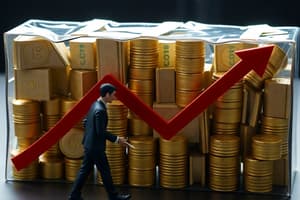Podcast
Questions and Answers
What happens to the value of money when the supply of money increases?
What happens to the value of money when the supply of money increases?
- The value of money increases.
- The value of money stays the same.
- The value of money decreases. (correct)
- The value of money fluctuates wildly.
How did the debasement of the denarius primarily affect its value?
How did the debasement of the denarius primarily affect its value?
- It caused the denarius to become almost worthless. (correct)
- It made each denarius more valuable.
- It caused inflation to decrease.
- The debasement had no impact on the denarius.
What is inflation primarily defined as in the content provided?
What is inflation primarily defined as in the content provided?
- An increase in the amount of money. (correct)
- A decrease in money supply.
- A rise in the value of commodities.
- An increase in the supply of goods.
Why did prices of goods rise in the Roman Empire according to the content?
Why did prices of goods rise in the Roman Empire according to the content?
What major comparison is made concerning inflation in both ancient Rome and modern times?
What major comparison is made concerning inflation in both ancient Rome and modern times?
What key point is made about inflation and rising prices?
What key point is made about inflation and rising prices?
What was the price of a bushel of wheat in 100 A.D.?
What was the price of a bushel of wheat in 100 A.D.?
In 2003, how much was the amount of dollars in circulation in the United States?
In 2003, how much was the amount of dollars in circulation in the United States?
What does the law of supply and demand state regarding an increase in supply?
What does the law of supply and demand state regarding an increase in supply?
What does the content suggest is a common misconception about inflation?
What does the content suggest is a common misconception about inflation?
Flashcards
Law of Supply and Demand
Law of Supply and Demand
The law of supply and demand states that when the supply of something increases, the price per unit decreases. For example, if there is a lot of something, it becomes cheaper due to higher competition. If there is only a little, it becomes expensive due to scarcity.
Inflation
Inflation
The process of a currency losing value over time is called inflation. This means that you need more money to buy the same amount of goods and services. Inflation happens when too much money is printed and circulated.
Counterfeiting
Counterfeiting
Counterfeiting occurs when someone makes fake copies of something, especially money. In ancient Rome, politicians devalued the denarius by making more copies, leading to inflation. It is illegal to counterfeit money in modern society.
Debasing Currency
Debasing Currency
Signup and view all the flashcards
Price Inflation
Price Inflation
Signup and view all the flashcards
Denarius
Denarius
Signup and view all the flashcards
Inflation and rising prices
Inflation and rising prices
Signup and view all the flashcards
Government spending and inflation
Government spending and inflation
Signup and view all the flashcards
Value of Money
Value of Money
Signup and view all the flashcards
Inflation is global
Inflation is global
Signup and view all the flashcards
Study Notes
Inflation Explained
- Inflation is an increase in the amount of money in circulation, causing the value of each unit of currency to decrease, and prices to rise.
- The law of supply and demand applies to money: more money = lower value per unit.
- The Roman Empire experienced high inflation due to excessive coinage, leading to a dramatic drop in the denarius' value. A bushel of wheat that cost 3 denarii in 100 AD, cost 2 million in 344 AD.
- Modern economies, including the US, also experience inflation. For example, prices of goods rose as the amount of US dollars increased, from roughly 200 billion in 1968 to 1.3 trillion in 2003.
- Inflation is not the same as rising prices—inflation causes rising prices, whereas other factors may also contribute to price increases.
- Inflation, besides higher prices, has other consequences, which will be covered later.
Effects of Inflation
- When the money supply increases, the value of each individual unit of money decreases.
- This results in rising prices for goods and services.
- People need more of the devalued currency to buy the same amount of goods.
- The value of the currency (like the denarius or modern dollar) is what decreases during inflationary periods, not the value of goods being purchased.
Studying That Suits You
Use AI to generate personalized quizzes and flashcards to suit your learning preferences.




